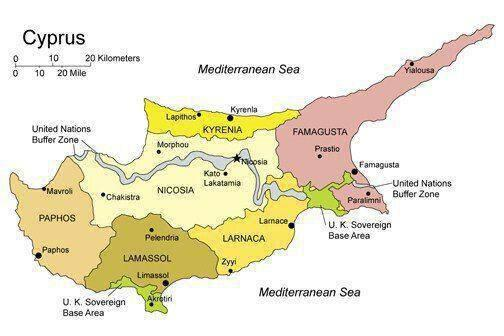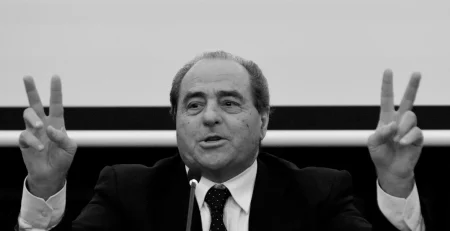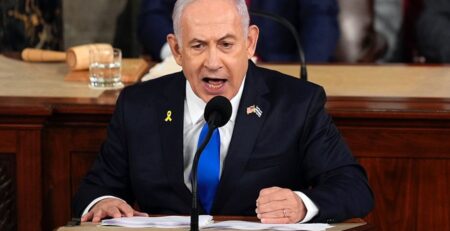50 χρόνια μετά: Το «Κυπριακό μοντέλο» της Τουρκίας είναι ακόμα επικίνδυνο

Turkey’s Cyprus Model Could Destroy the International Liberal Order: Today marks the 50th anniversary of Turkey’s invasion of Cyprus. Turkish arguments that they intervened to protect the Cypriot Muslim population are false. Turkey’s major land grab of more than one-third of the island came after the crisis had passed and against the backdrop of Geneva peace talks. President Recep Tayyip Erdogan said the quiet part aloud when, last March, he told Turkish military personnel, “Perhaps if we had pushed south, and I say this as a child of the present, there would be no more south and north and Cyprus would be ours only.”
The result was not protection for Turkish Cypriots, but rather their cultural demise. Successive Turkish leaders uprooted entire villages in Anatolia and gifted to their inhabitants Greek villages the Turkish forces ethnically cleansed. The Turkish government may treat Turks and Turkish Cypriots as synonymous, but the two have separate cultures and dialects. Anatolian Turks like Erdogan himself tend to be far more conservative religiously. In contrast, Cypriot Turks, accustomed to living on an island interspersed with their Christian brethren, are far less doctrinaire and more tolerant of other practices and religions. Today, the Turkish-occupied zone systematically denies native Cypriots meaningful political representation as Quisling officials loyal more to Turkey than Cyprus manage the northern zone.
Among diplomats who serve two-year tours and for Americans who view anything beyond a decade as ancient history, the division of Cyprus can appear permanent. If the international community cannot reverse Turkey’s occupation, why not with sleight-of-hand simply recognize the new reality? Erdogan pushes hard for such an outcome, while the State Department encourages him by refusing to use “occupation” to describe Turkey’s actions.
Allowing Turkey to benefit from the Cyprus model would be a disaster, however, for three reasons. First, it justifies Turkey’s use of the Cyprus occupation model elsewhere. Second, it legitimizes Russia’s tactic of carving out illegitimate states from its neighbors like Georgia, Moldova, and Ukraine. Third, it creates spaces in which terrorism and money-laundering thrive.
Turkey’s occupation of Cyprus began a process that unfolded over years. Ethnic cleansing closely followed the initial invasion. Turks erased the Greek language and destroyed Greek churches. Ankara tried to organize the local indigenous population, but barring their complete buy-in to the Turkish imperial project, Turkey began transferring settlers into the region. Turkey also began linking the occupied zone to Turkey proper: imposing the Turkish currency, linking the occupied zone to Turkey’s postal system, making Turkish the official language, imposing Turkey’s state curriculum, establishing local branches for Turkey’s universities, and enabling visa-free travel. While the Turkish zone only formally declared its independence in 1983, it remains a colony. Vichy France has more independence from Germany than the so-called Turkish Republic of Northern Cyprus has from Turkey.
Security risks to Europe, the broader West, moderate Arab states, and Israel are growing. Not only is the Turkish-occupied zone now a money laundering and sanctions evasion hub for both Russian and Middle Eastern terror groups, but it also serves as a staging point for Hezbollah and other terrorist groups seeking to kill Jews or infiltrate into Europe.
The danger of allowing time to launder the Turkish actions is apparent today in both Syria and Iraq. In 2018, Turkey moved into Syria’s majority Kurdish Afrin district and immediately began expelling Kurds, destroying their cultural property, importing settlers, issuing new Turkish identity card, opening post offices, changing school curriculums, and establishing university satellites. Today, Afrin is both a Turkish satrapy and a breeding ground for Islamic State and Al Qaeda militancy that Erdogan encourages but from which he seeks plausible deniability.
Turkey has also implemented the Cyprus model in Iraqi Kurdistan. Since June 15, 2024, alone, it has undertaken more than 380 bombing runs to force Kurds from their villages, and Turkish forces have burned more than 250 square miles of agricultural fields. The Turkish army has also established checkpoints that undermine any commerce not approved by Turkey. Turkish defense officials openly lay claim to oil fields within Iraqi territory. While Turkey says its incursions counter Kurdish terrorism, the Turkish government has been unable to demonstrate any attacks originating from Iraqi Kurdistan that would justify its occupation. Meanwhile, Turkey has refused to withdraw any troops, leaving thousands based in both Kurdish and Arab towns where locals complain of near-constant abuse. While Iraqi Kurds kept order, today, everyone but Turkish intelligence remains blind to terrorism that militias imported from Turkey germinate in the region.
As great a danger is the quest for permanent partition and recognition of the Turkish Republic of Northern Cyprus as a legitimate state. Azerbaijan and Pakistan both appear ready to recognize the occupied zone as independent and Erdogan pressures Kazakhstan and Uzbekistan to follow suit. Should they do so, they set a precedent that could apply to Abkhazia and South Ossetia, wrested from Georgia by Russian troops in 2008, and the puppet state of Transnistria that Russia carved from sovereign Moldovan territory. Given Erdogan’s hints that he seeks Cypriot Anschluss to Turkey, any recognition would also further Russia’s strategy in Ukraine, where it first supported independence for the Donetsk and Luhansk People’s Republics and next sponsored plebiscites for them to join Russia formally.
To reward Turkey even a half-century after the fact would unleash chaos in the international order as imperialist states like Russia and Turkey sponsor false separatist movements as a means to fulfill imperial dreams. Rather than react after the fact, now is the time to let Azerbaijan, Kazakhstan, Uzbekistan, and Pakistan know that any recognition of northern Cyprus will result in a severance of U.S. assistance. For Kazakhstan to accept any Turkish or Russian bribe in exchange for northern Cypriot recognition could be national suicide, especially given its own susceptibility to ethnic Russian separatism. Pakistan, too, should understand that any support for partition of Cyprus could lead to foreign support contesting its own sovereignty over Baluchistan or Sindh.
It is not too late to stymie Turkey’s imperial objectives and restore unity to Cyprus. There is no danger of ethnic cleansing or communal violence in Cyprus today. Demanding the exit of Turkish forces from Cyprus should be an American and European Union priority and a prerequisite for any financial aid or military assistance to Turkey. Nor is it impossible to differentiate between legitimate Cypriots and Turkish settlers. When residents of the occupied zone apply for Cypriot passports, they can prove their ties to the island through birth and marriage records. If Turkey can spend hundreds of millions of dollars subsidizing jihadist groups from Africa to Azerbaijan and from Benghazi to Baku, then surely it can afford to relocate illicit Turkish settlers back into Anatolia. Indeed, Erdogan’s cronies might relish the ensuing construction contacts such a move would mandate.
About the Author: Dr. Michael Rubin,
Michael Rubin is a senior fellow at the American Enterprise Institute, where he specializes in Iran, Turkey, and the broader Middle East. A former Pentagon official, Dr. Rubin has lived in post-revolution Iran, Yemen, and both pre- and postwar Iraq. He also spent time with the Taliban before 9/11. For more than a decade, he taught classes at sea about the Horn of Africa and Middle East conflicts, culture, and terrorism, to deployed US Navy and Marine units.
*Τα ενυπόγραφα κείμενα απηχούν τις απόψεις των συγγραφέων τους/ Πηγή: nationalsecurityjournal.org




